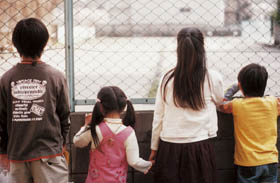Tenderly told film examines innocence lost.
The worst part about Kore-eda Hirokazu’s Nobody Knows is that it is based on a true story and the best part is that all preconceived Home Alone notions of how children deal with an empty house during an extended period of time is totally thrown out from say, the third storey balcony window. Rolling into theatres a little too late for art-house fans aware of scorecard results at Cannes, this cinephile-approved, intensely gratifying look into the microcosm of a cramped Tokyo apartment offers a whole new appreciation for the child as an actor and an admiration for the sort of production that is geared towards aestheticism rather than sensationalism.
Based on an unfathomable news headline item that captured the Japanese nation’s attention in the late eighties, this chronicles the results of a sadistic abandonment of four human lives by a mother who is clearly unfit to care for her offspring. Conveniently conditioned to not make aware of their existence, the real-life drama with a docu aesthetic investigates the degrading environment in which these four children ranging in different ages and coming from various fathers become accustomed to. In one part the film text stresses the incredible resourcefulness of a child dealing with neglect but it also screams the need for children to remain children and not have to worry about paying bills or putting food on the table.
Fascinatingly told through the point of view of the children, Hirokazu isn’t interested in what the character of the mother or what her absence comes to symbolize, but instead he details the inexplicable in how children are victimized by the appalling lessons that resemble Third World-like conditions. The eldest figure played by Yagira Yuya – the youngest winner ever for Best Actor at Cannes – provides the most alarming representation with a face that normalizes the abnormal. The film’s strongest suit is in the pacing with the temporal treatment of the narrative allowing the seasons, the hair growth and the defecation of their shelter to prescribe insight into their psychological state.
This is a strong piece of national cinema that discusses an issue that is not appropriated to one tongue and despite the tragic consequences that unfold; audiences will feel a strong connection to and compassion towards the protagonist. Nobody Knows’ magnifying glass look into little people’s survival with long takes and a long run time allows for a certain poeticism to creep in making interesting breakthrough moments as when they leave the confinement of their home and decide that they can play in the openness of a park more interesting than any prison-break type of movie. This is an deeply affecting film not to be missed.
Viewed in original Japanese language with English subtitles.
